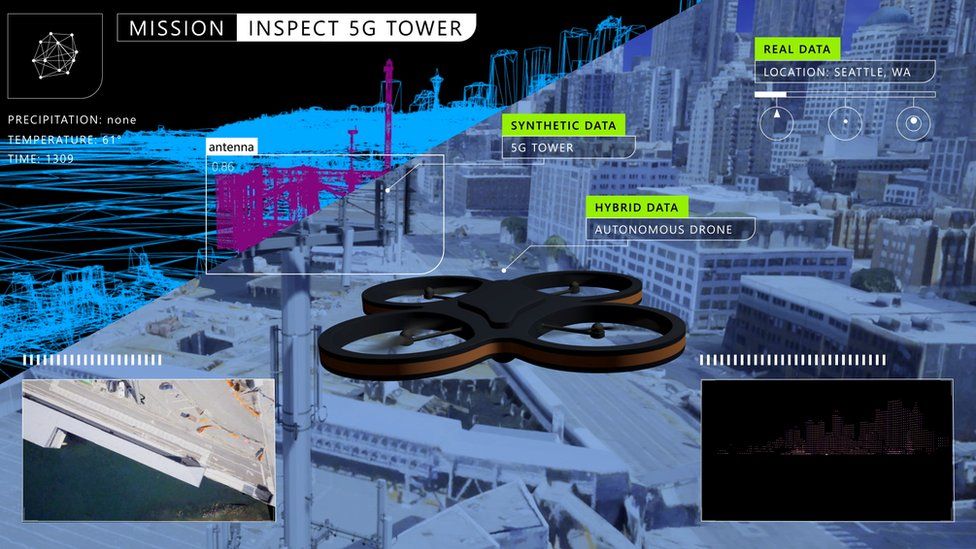
Tech giant Microsoft is to train the artificial intelligence systems of drones.
Project AirSim is to become a flight simulator for autonomous aircraft.
This means that companies can use to train and develop software for controlling them.
In addition, it makes it possible for test flights in places that would be too risky in reality, such as near power lines.
According to Microsoft, millions of flights can be simulated in just seconds.
For example, clients will be able to see how their drone performs in adverse weather or how strong winds might affect its battery life.
Microsoft executive Gurdeep Pall said that Project AirSim showed “the power of the industrial metaverse – the virtual worlds where businesses will build, test and hone solutions, and then bring them into the real world”.
The firm sees the tech being used to train the AI systems which fly autonomous air vehicles from air taxis to delivery drones.
Seattle-based Microsoft has a long history in virtual flight and later this year, Microsoft’s Flight Simulator game will celebrate its 40th anniversary.
According to a BBC report, Project AirSim’s history is more recent, growing out of an open-source project of the same name that was used by a number of researchers but Microsoft has announced that it will retire that project.
Users will still have access to the original open-source project’s code, the company told the BBC, but it will be archived, and instead the firm will focus its efforts on the new product.
The new proprietary platform, the company says, contains more out-of-the box features, and requires less technical knowledge to use.
However, Microsoft says its goal is to offer a free option, and says it will provide more information as the general release date approaches.
The project runs on Microsoft’s cloud computing platform Azure.
Go to https://www.microsoft.com/
US firm, Airtonomy, was given early access to the platform because the firm uses drones to inspect infrastructure, such as wind turbines and power lines.
The flight routines that enable this are developed in the virtual environment of Project AirSim, and Mr Riedy says a big advantage is the “simulated environment allows us to make mistakes” when working with critical infrastructure.
It also allows developers to imagine “what if” scenarios that would be unsafe to test in real life – such as what happens if a drone’s vision is obscured.
Microsoft hopes that it could also be used by civil aviation regulators to test systems – seeing how the drone performs in extremely heavy rain, or copes with a loss of positioning data.
As well as libraries of digital environments, developers will also have to access already trained AI “building blocks” which the firm hopes will reduce the expertise needed to develop systems.
Ashish Kapoor, creator of the original open-source AirSim, said in a statement that he hoped data gathered on the new platform would help put “many more vehicles in the sky, helping to monitor farms, inspect critical infrastructure and transport goods and people to the remotest of places”.
ABOUT MICROSOFT
Microsoft Corporation, commonly known as Microsoft, is an American multinational technology corporation which produces computer software, consumer electronics, personal computers, and related services headquartered at the Microsoft Redmond campus located in Redmond, Washington, United States. Its best-known software products are the Windows line of operating systems, the Microsoft Office suite, and the Internet Explorer and Edge web browsers. Its flagship hardware products are the Xbox video game consoles and the Microsoft Surface lineup of touchscreen personal computers. Microsoft ranked 21st in the 2020 Fortune 500 rankings of the largest United States corporations by total revenue; it was the world’s largest software maker by revenue as of 2016. It is one of the Big Five American information technology companies, alongside Google, Amazon, Apple, and Meta.